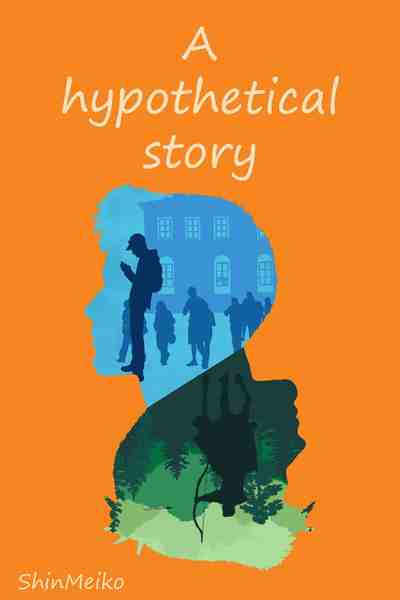In all her years as a psychiatrist, she has seen a lot of people, a lot of conditions, a lot of pains, a lot of everything, really. And yet, every single time she steps into a room to meet a new patient, it feels unseen, and it is like starting over. Of course, she has techniques and strategies, but she also knows that every person is unique and you need to learn the person before you can decide how to treat the condition.
So she didn’t have a very set up plan when she entered the plain bedroom to meet her new patient. Some professionals are trying to introduce the idea of calling them ‘clients’ but she can’t quite wrap her head around it. It makes her feel like she is there for the money more than the person.
The light coming through the window is golden but it doen’t help brighten the room that remains white and grey. That is something she never understood about these places: no one would get better from anything, especially depression, when everything is so lifeless.
Not that the boy in front of her is suffering from depression. Not just that, at least. She didn’t want to put any words on what he might be suffering from until she at least talked to him. She often found that walking in with a preset idea tends to lead people to try to bend reality to fit that idea. That doesn’t happen with a blank canvas.
Although having followed the story in the news and read the police reports yesterday dooesn’t help her see the boy as a blank canvas.
“Hello, Thomas. I am Doctor Stanford. I would like to have a little chat if that’s alright with you.”
The boy detaches his eyes from the window and looks at her, gauges her, really, before shrugging and reporting his attention to the park outside. He seems a little detached from the present, as if he was heavily medicated. But his file states that he refused any treatment and that none has been forced on him so far.
On the other hand, his troubles accepting reality are a part of why he is here.
She sits next to the bed, a little far from the window seal he had decided to sit on, making sure not to intrude any personal space, and simply asks: “How are you feeling today?”
“I’m not crazy.”
“No one said you were.”
“Not in front of me,” he concedes. “But someone did if I ended up here.”
“Needing some time to get better doesn’t mean that you are crazy.”
“I don’t need to get better.”
“What do you need, then?”
“I need to speak to the others.”
“By ‘the others’, I suppose that you are referring to Edwin or Maya?” He looks away from the window, straight into her eyes, and nods, eyes full of hope. It almost pains her to have to kill that feeling. “You have not been allowed to be in contact until you tell us where the other missing students are.”
He doesn’t reply anything but he also doesn’t look like he is going to withdraw. She didn’t cut the conversation short by asking too bluntly. Good to know. “You boys have been more silent than the girl.”
“I’m not a boy.”
“I’m sorry?”
“I’m nineteen, I’m not a boy.”
“I’m fifty-seven. You are a boy. But if you don’t like that terminology, I’ll avoid using it.” She knows that having a blunt approach isn’t the best decision with most people, but she has a feeling that this boy – because he is still a boy even if he thinks he knows better – would reply better to honesty, in whichever form. “As I was saying, Maya has talked more than you.”
“And we saw where that led her.”
“Where did that lead her?”
“The word ‘crazy’ has been used for her. More than once and to her face.”
“I don’t think she is crazy.”
“But you don’t think she is telling the truth either.”
“Is she? Telling the truth?”
“I’m not stupid enough to answer that.”
“Fine. Should we talk about the day you and six other students went missing?” The boy reports his attention to the park again and remains silent. “I am not the police, I am not your family… you can talk to me.”
“Right. You are simply the person who can decide to have me locked up here forever. Or send me somewhere worse, probably.”
Truly, he is ascribing her more power than she actually has.
“Thomas, can I be honest with you?”
“I don’t know. Can you?”
She decides to not take the bait and simply asks: “What do you think will happen if you refuse to talk about what happened to you?”
“Nothing happened to me.”
“I do not believe that for a moment. You were gone for over sixteen months.”
She notices that the boy’s jaw clenched. She is however unsure what triggered it. Memories of what happened during those months? A reminder that he missed out on a large chunk of his life? A random reflex?
“Thomas, I understand if you do not want to talk about the things that happened to you. But there are parents out there desperate to find their children. Three of you came back but four teenagers are still missing. We need to find them.”
“You really don’t. Just leave them there.”
“Where is ‘there’?” He completely ignores her so she tries to prompt him again by asking the question everyone really needs an answer for: “Are they still alive?”
He looks at her again and she is almost surprised when he says: “I want to talk to Ed and Maya. What do I have to do to make that happen?” He has not answered her question, but he is definitely opening a line of dialogue. At the very least, he is giving her an option to get something she wants by telling her what he wants in exchange. Fine. Bargaining. Negotiation. She can do that.
“You can have all of that as soon as we found all the missing students. Tell us where they are and I will let you see your friends. Actually, tell us where they are and you will be able to make that call on your own.”
“Maya already told you where they are.”
“I don’t know what you think she said but she has not provided their location. Your friend is suffering from serious trauma and she created a whole reality to avoid facing what happened.”
The boy looks outside again and she knows that something she just said triggered him to pull away. That is interesting because she didn’t expect this sentence to be more triggering than others she used before.
“We told her to stay quiet,” he mumbles. “But she said that if it weren’t lies, it would all be fine. And now we’re here.”
“I’ll ask you again: is she telling the truth? If you boys confirmed her story, the outcome might be different.” The outcome would be the same. She personally thinks that they would be better off recovering at home but when three of the teenagers reappeared after months of unsuccessful research, two of them refusing to say anything, and one of them claiming that they had been taken to a magic world and that their friends were probably still there, it raised all kinds of flags. The three teenagers are now in this facility until someone higher up than her decides what to do with them.
Her job is to get them to talk. It was easy with the girl but all she said was nonsense. Then again, she is thirteen years old and was barely twelve when she went missing. It isn’t surprising that she created some kind of dissociative reality to help her cope with whatever happened to them. They do seem generally healthy, however there are traces of scarring on both boys’ bodies, their silence – especially with their families – is worrying, and there have been hints in the girl’s stories that one of the missing children is now dead.
Her first instinct would have been to reunite them and see if they opened more that way – apparently, they talked to the man who found them that night when it was the three of them but that all stopped when they made it to the police station and because he was under the influence, the man’s recollection of what they told him is blurry and mixed up at best, fabricated at worse – but her instructions are to keep them separated so they cannot ‘get their stories straight.’ Whatever that means in this case.
“Why would she lie?”
“It is possible to not lie and yet not tell the truth.”
He nods, as if he agrees with her statement, but he doesn’t answer her question. Instead, he asks his own: “Is she sleeping alright?”
Surprised, doctor Stanford answers to the best of her knowledge: “Yes, I believe she is.”
“Good. It’s hard to sleep here.”
“Aren’t you worried about Edwin's sleep?”
“Edwin can sleep through anything.”
“Did you have good sleeping conditions when you were away?”
“Most times. Not at first.” Okay. This is definitely vague but this is the first question about their time away he answers and she thinks it might be her opening. She just doesn’t know to what.
“What changed?”
“Better beds.”
“Did someone provide you those better beds?”
“Well, I didn’t make them myself.”
“I understand that, but—”
“I know what you’re trying to do,” he interrupts her. “You want to know if we ran away or if someone took us.”
He stares at her and it seems like he is challenging her to tell him otherwise. She decides to be honest with him once more: “It would be a valuable piece of information to have. Even if we try to decipher the truth from Maya’s stories, that part is unclear.”
“I’ll talk if you let me see them.”
“Will you answer all the police’s questions?”
He thinks about it for a moment then he decides: “No.”
“Why not? Listen, if you blame yourself for anything, then I’m sure the circumstances—”
“It’s not that.”
“What then?”
“They ask the wrong questions.”
“What would be the right questions?”
“It doesn’t matter because no one is willing to listen to the answers.”
“You haven’t given us any answers.”
“Maya has.”
“I’ll ask again. Is she telling the truth?” It would be very interesting to know if the boys would corroborate her story. And if so, is it something they rehearsed before coming back – or being set free – or are they sharing the same delusion? A story they told each other at night to feel safe before falling asleep?
“Let me see them and I’ll tell you a story,” he finally says and his tone is more intense than it had been since she came in.
“What kind of story?”
“Exactly the type you want to hear. A great one. With adventure, magic, war, travels, peace, castles, trials, betrayals, unexpected friendships, xenophobia, acceptance, politics, and even romance.”
“It sounds like a long story.”
“Maybe a sixteen-month story,” he hints. The girl’s story didn’t cover all those themes, but she mentioned magic – obviously –, traveling, war and castles.
“Or you could just tell me where the others are and end this all right now. I’ll even listen to your story if you really want to tell me it.”
“I don’t know how to get to them.”
“Even if you’re vague, it will help the police.”
“The police can’t get there.”
“How do you know that for sure?”
“If it were possible to get back there, we would be back there.”
“Voluntarily?” He ignores her questions and simply stares at her, awaiting an answer for his own request. Fine. “I will make a deal with you. If it truly is a good story, I will let you see your friends.” She doesn’t know if her management would agree with that promise but if the boy leads them to the missing children, surely they will at least grant him that. Even if he did do something he doesn’t want the police – or anyone – to know about.
“It is a long story,” he warns her.
“I have time.”
He looks at her notepad and asks: “Will you take notes?”
“I will.”
“Will you record the story too?”
“Do you want me to record you?”
He shrugs. “What will happen with the tapes if you do?”
“You are covered by doctor-patient confidentiality.”
“To a certain point.”
“Well, I—”
“It’s not what I meant anyway,” he interrupts her. “I want to know if they’ll be destroyed or erased or whatever.”
“No, they will be archived.”
“So whatever I say… there will be a trace of it? The story will exist out there?”
“Yes.” She doesn’t know if that was the right answer but his shoulders relax slightly and his face is less tense. She would understand that he would feel like telling his story would lift a weight off his chest, but she isn’t quite sure why having it recorded would impact him this way. It seems like an easy win, though, and she gets her voice recorder out of her bag.
“Shall we start, then?” she asks, expecting him to postpone somehow.
“First or third person?”
“Sorry?”
“Do you prefer your books in the first or third person?”
“Oh. I don’t mind. Whatever comes more naturally to you.”
“Fine. Then let’s imagine that this story starts sixteen months ago during a school’s open house. Thirty students come to help, a lot more come to visit, but seven of them disappear during the day.”
“I’m invested already,” she says, knowing that he won’t just tell her what happened. She will have to decipher the truth behind the story that they – or their subconscious – fabricated. But the truth will be there, somewhere.













Comments (11)
See all